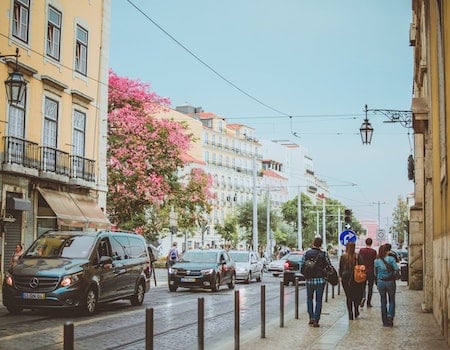Is Portuguese Hard to Learn?
Portuguese is not just a beautiful, melodic language with a rich history and some of the best music you’ll ever hear. With 200 million speakers worldwide, the Portuguese language is growing in importance every day. In today’s globalised world, Portuguese is used to form intercultural connections, facilitate communication in international business settings, and open opportunities for individuals to explore different cultures and regions of the world. As a result of its increasing relevance, many people are now looking into learning the language – but is it really as hard as it is sometimes made out to be?
In this article, we will discuss whether Portuguese is a difficult language to learn and consider how the difficulties of studying Portuguese can be surmounted.
Table of Contents
→Sign Up Now: Free Trial Portuguese Lessons With a Native Teacher!←
Why Portuguese is Relatively Easy
Is Portuguese hard to learn? Here are 4 reasons why the answer to this question is a definite “no”.
1. Do you already know a little Spanish? Then you’re in luck – Portuguese is very similar to Spanish and learning one language will make it much easier to understand the other. In fact, if you already speak Spanish, you’ll be able to understand around 80% of Portuguese. For example:
Spanish – Portuguese
Amigo – Amigo
Casa – Casa
Escuela – Escola
Hospital – Hospital
Cuerpo – Corpo
2. Portuguese grammar is surprisingly simple. The rules of Portuguese are straightforward, with few exceptions and irregularities, which makes it much easier to get to grips with the language than some of its more complex counterparts (especially those that don’t even use the Latin alphabet!). What’s more, the order of words in Portuguese is the same as in English: SVO (subject – verb – object): My sister writes poems / Minha irmã escreve poemas.
3. Portuguese pronunciation is another plus. While the language has its own unique, exotic sound, it’s generally not too difficult to pronounce as long as you spend some time studying the phonetics. Unlike English, which has many different pronunciations for the same sounds (consider the “A” in tall, cat, car, name) – Portuguese has only one pronunciation for each of its sounds!

Portugal, via Pexels.
The most challenging aspects of learning the Portuguese language
Is Portuguese hard to learn? Of course, it wouldn’t be honest to say learning Portuguese poses no challenges at all. But then again, we couldn’t say that about any language, right? Here are some of the potentially more difficult aspects of learning Portuguese:
Regional pronunciations
As is the case with every major language, Portuguese is spoken in several different countries, and the language varies slightly depending on where you are. And, while there are no major differences in pronunciation, it’s still worth being aware of the differences.
Brazilian Portuguese, for example, is often described as being softer and more lyrical than its European counterpart, which has a more ‘closed’ sound. If you want to study Portuguese ahead of a trip to a Portuguese-speaking country, make sure you learn the right variety!
Grammatical gender
One of the trickiest aspects of learning Portuguese is that it assigns a gender to nouns (masculine and feminine). Unlike English, which has no gender distinction for objects or concepts, Portuguese uses suffixes to change the forms of articles and adjectives depending on the gender of the noun they modify. For example:
- English: a chair, a table, a bench, a ceiling.
- Portuguese: uma cadeira, uma mesa (fem), um banco, um teto (masc)
While this feature may seem strange at first, it’s actually quite easy to get used to. All you need is a little practice and patience.
The subjunctive mode
The subjunctive mode is used to express wishes, hopes, possibilities, doubts or uncertainty.
This, of course, is not new for English speakers! In English, we use the ‘second conditional’ to talk about hypothetical situations in the present or future. For example:
“If I won the lottery, I would quit my job and travel the world.”
However, in English, the ‘conditional clause’ (If I won the lottery) uses a verb form that coincides with the past simple conjugation. Portuguese, on the other hand, uses a specific verb form called ‘imperfect subjunctive’ in the same situations.
This means that, in order to make conditional sentences, you have to learn a whole new set of verb declensions!
How to learn Portuguese Faster
So, is Portuguese hard to learn? All in all, and despite a few challenges, Portuguese is one of the easiest languages to learn. And you can make the learning process even smoother by following these tips:
1- Learn complete sentences
The best way to learn a language is by using it in real-life situations – and complete sentences are the key here. Don’t just memorise individual words – instead, try to understand how they fit together to create meaningful phrases. For example, if you are learning the language to socialise with Portuguese coworkers, learn phrases such as “Prazer em conhecê-la” (Nice to meet you) and “Como vai?” (How are you?)
2- Listen and repeat
Is Portuguese hard to learn? Not if you listen and repeat every day.
Listening is a crucial part of language learning. If you want to get used to the sounds of Portuguese, try to immerse yourself in the language by listening to radio stations, podcasts or Portuguese songs on YouTube. As you listen, repeat words and phrases out loud to get used to the way they sound. Remember: learning a language is like learning a musical instrument: the more you practise, the better you’ll sound.

Streets of Portugal, via Pexels.
3- Opt for customised lessons
Why would you waste your time in a crowded classroom when there are plenty of online Portuguese teachers who can tailor lessons according to your needs? By taking a tailored Portuguese course, you get feedback and guidance in real-time and, more importantly, you get to learn exactly what you need to know to achieve your personal, academic or personal goals.
Jessie, a client from Liverpool who took an online Portuguese course with Language Trainers last year, says: “I’m really glad I took a Portuguese speaking course with Ivanox, it was way faster and more effective than a traditional class. He gave me detailed feedback and was always available to answer my questions. Thanks to him, I’m now able to communicate with colleagues and family back home in Portugal”
→Sign Up Now: Free Trial Portuguese Lessons With a Native Teacher!←
So, if you are looking for an effective way to learn Portuguese, don’t hesitate to take one of our customised online lessons. All you have to do is send us a quick inquiry now and we’ll get back to you within 2 business days to offer you a free taster lesson!
Stop waiting and get in touch with us now. Soon you’ll see that the answer to the question “Is Portuguese hard to learn?” doesn’t have to be daunting!
